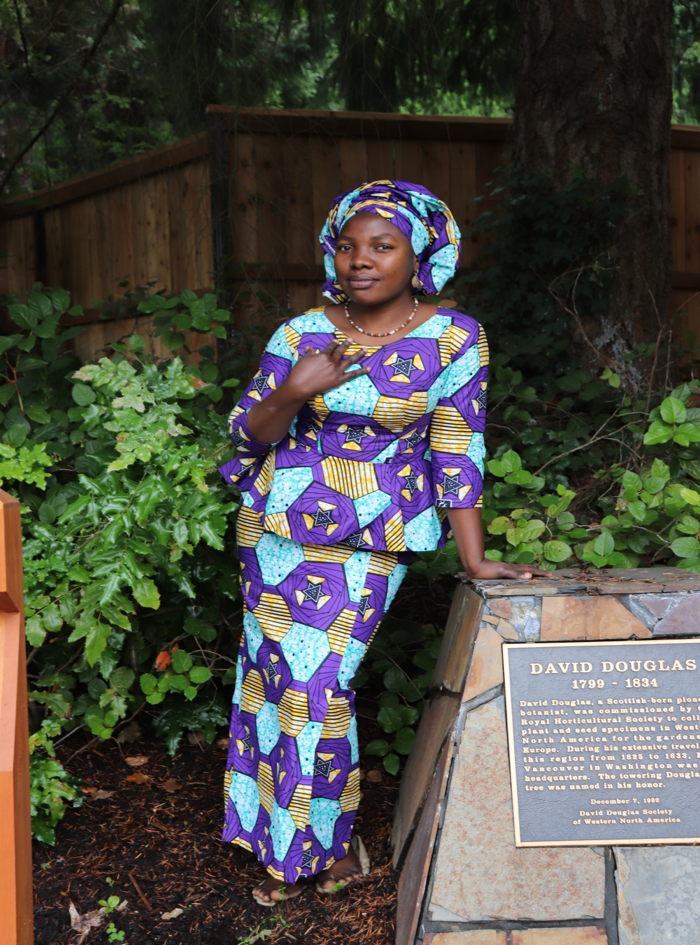Fearless Voice: Temitope Dauda
Temi Dauda, A forest conservationist and professor from Nigeria and an International Fellow with the World Forestry Center, lends her perspective as August's fearless voice.
In our “Fearless Voices” series, we profile environmental advocates, organizers, directors, scientists, artists, creators, makers, and DEI (diversity, equity, inclusion)-focused leaders that are re-defining what conservation looks like. For this installment, we connected with Temitope (Temi) Dauda, an International Fellow with the World Forestry Center who is working at Columbia Land Trust to learn more about the non-profit approach to forest conservation in the United States.
Tell us a little bit about yourself.
I am a forestry professional from Nigeria living in northeast Portland. I work as an International Fellow with the World Forestry Center, which is based in Portland. As an International Fellow, I am here to learn about forest and landscape conservation initiatives and to network with experts and conservation organizations in the Pacific Northwest. I am here for only 6 months, but I hope to extend these relationships into the future. In the Pacific Northwest, one has the privilege of enjoying different outdoor events, depending on where your interests lie, which is different from how my country operates. For example, I have attended open discussions on motherhood, listened to people talk about lifestyle, health, and so on. Living in the Pacific Northwest for these past few months has been an awesome experience for me. From the feel of nature right from when I step out of my house to traveling through the different parts of the Pacific Northwest to see different landscapes. Though it has not been without some cultural shock. One of my favorite things to do is getting off the bus and walking about an hour to my house after work. I really enjoy doing that because I get to see beautiful gardens and sceneries, and that experience feels new every day. I also like to visit nurseries to window shop for house and outdoor plants. I also love to hike a couple of miles, even though I haven’t done as much as I would like to do because of time constraints. I have enjoyed new cuisines, and it’s very interesting because in the Pacific Northwest, there is a wide variety of everything, even your regular sandwich. I have attended a couple of outdoor events like an urban gardening tour at Lake Oswego. I have also had the opportunity to pick berries at Sauvie Island, which I enjoyed that a lot. I enjoy the fact that everyone seems to be aware and concerned about what is going on in their environment; it makes discussions about conservation easy.
What is your relationship with Pacific Northwest nature and the outdoors like?
My relationship with nature and the outdoors of the Pacific Northwest is what I would describe as impactful. Every time I step out, I learn something new, and I eventually realized that, in the Pacific Northwest, I am close to nature everywhere. However, through the World Forest Institute, I have been able to experience nature much closer and much more than I initially thought I knew. For example, I have learned about the real-life experience of the aftermath of wildfires when we visited Eagle Creek. Such experiences have not only sharpened my view on the urgency of the need for active conservation in the Pacific Northwest but also the need for conservation planning to incorporate issues such as fire disturbance in my country, even though our forests are not as fire-prone as the forests in the Pacific Northwest.
Can you think of an example of “Fearless Conservation” in your life? What issues of Northwest conservation do you care about most?
The most recent example of fearless conservation in my life is leaving my young daughter behind to come to the United States to learn about conservation in the Pacific Northwest. However, back home I can think of many examples of fearless conservation. The one that quickly comes to mind is working in the northern part of Nigeria, despite my being a woman and not being a native. I remember everyone being afraid for me when I told them that I was going to northern Nigeria to work. However, this was, and still is, one of my most amazing career experiences. From learning to speak the body language of the local Hausa men in order to establish woodlots and plantations to working without knowing what could happen security-wise the next minute. I successfully worked on the project for three years as a team leader and leaving there became almost impossible because of how much “getting along” that eventually happened.
Where do you work? What are your goals pertaining to your work?
I work as a Professor at Bayero University Kano, Nigeria, which is a publicly-owned tertiary institution in northern Nigeria. I am also an on-the-ground person, and over the years, I have worked and will continue to work with local communities and small landowners. I facilitate on-the-ground conservation work for private organizations. My career goals are to conserve landscapes, restore degraded landscapes, and recruit more ‘landscape champions’. I would also like to see a future where landscapes are connected while maintaining the ecological values, economic benefits, and socio-cultural values of the communities living in and around these landscapes.
Tell me what comes to mind with the question: What’s Your Place?
I belong to local communities. I belong where I’m talking to them and motivating them toward conserving landscapes. I belong where I’m helping them explore opportunities and helping them conserve their land in better ways. I belong where I’m in the field with them and getting dirty. When I am in this space, I believe I can fly. Another thing that comes to mind is talking to my students, teaching them about forest and landscapes and sharing my experiences with them. Because I enjoy reading a lot, I believe I also have a place in front of computer screens.
